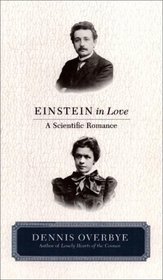Helpful Score: 1
Einstein In Love tells the story of Einstein's early years, when he cultivated his image as the shaggy and sloppy, garrulous and brilliant bad boy of physics and committed himself to twin passions: revolutionizing our understanding of the universe, starting with light, gravity and time; and living the bohemian life with the woman he'd eventually marry, Mileva Maric, a superior mathematician in her own right. At first, it seemed that Mileva and Albert would make the world together, but Albert's passion for physics proved the stronger. As Einstein's fame grew and his theories - the development of which Overbye explains brilliantly - gained adherents, he escaped the drudgery of work in the patent office for a series of university appointments, while his wife and their children faded into the background. He took up with other women, which, as the reader learns, was even sadder than it may at first appear, because of all that Maric gave up to be with him, including their first child, Lieserl, born out of wedlock and sent away so that she wouldn't hinder Einstein's career. Overbye's aim - which he accomplishes with the precision of a scientist and the ear of a musician - is to portray Einstein the man, not the myth ("no picture of Einstein can be complete that does not explore both disparate strains of his life, both the sacred and the profane"). In the end, the reader may come to like Einstein less but appreciate his achievements even more.
"Overbye has discovered a fiendishly clever way of tricking readers into understanding cosmology....
by describing the quirky personalities and brilliant minds of these scientists, he revals cosology to be a human and passionate enterprise. This lures the reader into wanting to know something of the science as well,which overbye explains with care and clarity." - Micheal Lemonick,Time"This is one of the most ambitious popularizations of science to be attempted in recent memory,Selsom has any science journalist said so much,,so well,inso few pages -Timothy Ferris,Scientific American
by describing the quirky personalities and brilliant minds of these scientists, he revals cosology to be a human and passionate enterprise. This lures the reader into wanting to know something of the science as well,which overbye explains with care and clarity." - Micheal Lemonick,Time"This is one of the most ambitious popularizations of science to be attempted in recent memory,Selsom has any science journalist said so much,,so well,inso few pages -Timothy Ferris,Scientific American




